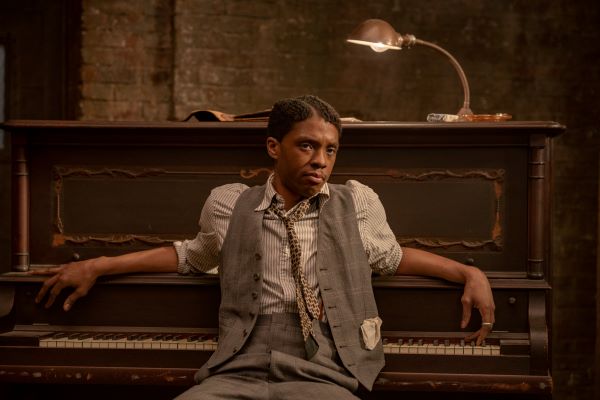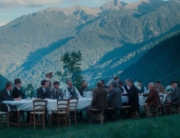

Ma Rainey’s Black Bottom begins with two men running breathlessly in the moonlit woods of 1927 Georgia. We hear the barking of dogs, which, for a moment, makes it seem like these two could be in danger, but this sound is soon replaced by a rich singing voice echoing through the night. The two then join a long line outside of a tent, where the words “Ma Rainey” are written on a banner above the entrance. Inside, the performance has already started. Ma Rainey (Viola Davis) is on stage in a sparkling mauve gown, holding a fan, using no microphone. She sings with a sense of camaraderie between her and the audience, who goad her with their enthusiasm. She is an expert, and sings as if she’s lived every word.
In many ways, this opening sets the precedent for the rest of the film. This is not the sort of film that quietly hooks you. It’s the kind that hits you with electrifying force. We watch, perhaps almost as Ma Rainey’s first audience did, knowing there is little to do but sit back and take it in.
Most of the action, however, is confined to one location. Based on August Wilson’s 1984 Broadway play, which was inspired by the real-life pioneering blues singer, the plot centers on a recording session with Ma’s band in Chicago, one that is fraught with many layers of tension. Much of this concerns the recording of a single song: “Ma Rainey’s Black Bottom.”
Levee (Chadwick Boseman), the trumpet player, has composed a new arrangement, one tailored to Harlem’s emerging uptown swing, and one that the studio’s white owner approves of. (Levee hopes to sell a few original songs to them as well.) They intend to have Ma perform his version, but Ma, we quickly learn, will have her own way. That might be an understatement.
Ma will arrive at the recording studio when she chooses, will hold everyone in the room accountable if she does not have what she needs, and she will play her song the way she wants. She also intends to have her nephew, Sylvester (Dusan Brown), give a voice intro to the song in contention—this becomes difficult for the band, since Sylvester has a stutter and, given the recording technology of the day, they need to perform the song perfectly in one take. But Ma will not be moved.
Describing the film in this way barely scratches the surface. Significant portions are set in a rehearsal room, where Levee argues with pianist Toledo (Glynn Turman), Cutler (Colman Domingo) on trombone, and bass player Slow Drag (Michael Potts). Sometimes their fights are more like playful jabbing, other times they are quite serious, but through these periods of waiting, their histories, their traumas, their aspirations, and the compromises they’ve made come to light. Each character in the ensemble is distinct, with an understandable point of view, even if we have harsher judgements toward some of them (such as the studio owner).
Chief among the ideas explored is that of ownership. Who owns these songs? Is it Ma, Levee, or the studio? What happens to someone’s music when you record their voice and sell it? Who does it really belong to at that point? How does someone become their own boss? There are no easy answers, and the film’s troubling close is a testament to how, throughout the 20th century, African American musicians were routinely dealt the losing hand by the white-owned recording industry.
Viewers who did not know this film is based on a play will not be surprised that it is, as it is dialogue heavy and a fair amount of the action takes place in one room. Yet acclaimed theater director George C. Wolfe is very much at ease behind the camera. While still honoring the text, he gives it cinematic life with his ability to vary dialogue sequences with cuts and close-ups, and none of the performances feel stagey.
All the actors are strong, but special kudos must be given to both Viola Davis and the late Chadwick Boseman, who is mercurial, bursting with Levee’s irrepressible energy. While embodying a larger-than-life figure, he captures the enthusiasm, quick wit, and pathos of the trumpeter, to the extent that he is always surprising. Seeing this makes his early death much more tragic.
I did not look at the cast list before I watched, and frankly, I didn’t recognize Davis. Her demeanor is so completely transformed by the toughness, bitterness, and compassion she brings to Ma that I was genuinely shocked when I saw her name in the credits. Her background in the theater shows, in the best way: her monologues sing with nuance and life.
Like Ma, these performances demand to be seen.






Leave A Comment